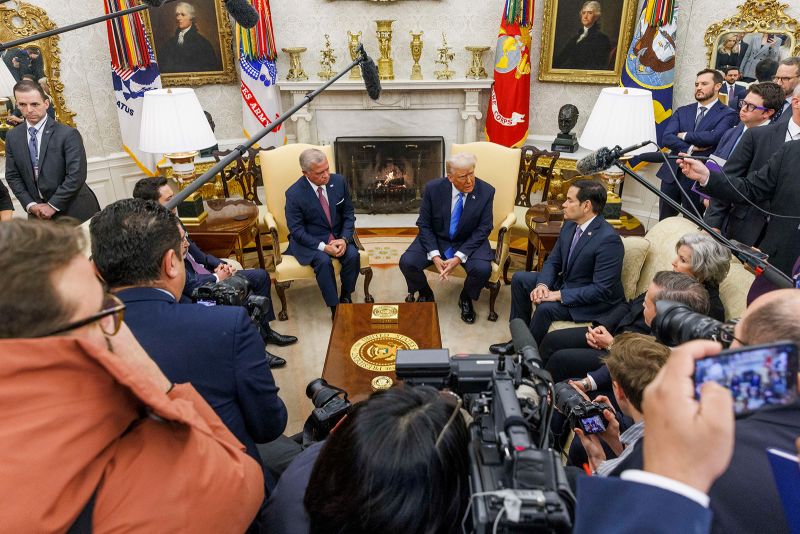
Trump’s Gaza ‘Riviera’ vision needed an Arab reality check. This royal visit only encouraged it
It was supposed to be the moment US President Donald Trump’s vision of bringing peace to the Middle East by redeveloping the war-torn Gaza strip into “Riviera” style premium housing and permanently relocating its more than 2 million residents finally got a reality check.
Instead, it was the moment the true scale of the challenge facing America’s Arab allies became clear.
When King Abullah II of Jordan met Trump at the Oval Office on Tuesday, there were widespread expectations that his visit – as the first Arab leader to meet the US president since his reelection – might help to rein in some of the more far-fetched elements of Trump’s vision. (To recap, Trump apparently envisions the US taking control of the territory, rehoming millions of Palestinian refugees in Jordan and Egypt, replacing the rubble of Gaza with glass towers with Mediterranean views and inviting “the world’s people” to move in.)
But it became clear almost as soon as Trump began talking at their joint press conference that he had no intention whatsoever of softening his proposal.
“I believe we will have a parcel of land in Jordan, a parcel of land in Egypt, we may have some place else but I think when we finish our talks we’ll have a place where they’ll live very happily,” Trump said, before brushing aside questions about what authority the US might wield to take control of the Palestinian enclave.
The embarrassment to King Abdullah, whose eyes twitched extensively as he listened quietly beside the US president, was clear.
After all, this was a man who was expected to – diplomatically – state in clear terms the Arab world’s almost universal opposition to the plan.
Instead, and despite his clear discomfort, he appeared to nod and praised Trump as a man of peace who could take the Middle East “across the finish line.”
Asked whether he agrees with Trump’s proposal to rehome the Palestinians, the king deflected, instead revealing that “Egypt and the Arab countries” had an alternative plan that would be revealed in due course and advising, “Let’s not get ahead of ourselves.”
“You could see the discomfort on the king’s body language and his face … they were completely talking past each other,” said Khaled Elgindy, visiting scholar at the Georgetown University Center for Contemporary Arab Studies.
A ‘bad bet’
Until that point, Egypt had said nothing publicly about having a counter-plan. Afterwards it issued its own vague statement, in which it referred to an “intention to present a comprehensive vision for the reconstruction of Gaza.”
Meanwhile, Arab social media erupted in criticism of the king, who was widely criticized for appearing to capitulate to Trump.
In what looked like an attempt at damage limitation, the king posted on X that he had “reiterated Jordan’s steadfast position against the displacement of Palestinians in Gaza and the West Bank.”
“This is the unified Arab position. Rebuilding Gaza without displacing the Palestinians and addressing the dire humanitarian situation should be the priority for all,” he wrote.
But by then, in many Arab eyes, the damage had already been done.
While Abdullah may have impressed Trump with his offer to take 2,000 of Gaza’s sick children, it’s clear his visit did little to persuade the president away from his desire to take Gaza. If anything, the limpness of the opposition may only have encouraged Trump.
“We’re going to have it (Gaza), we’re going to keep it, and we’re going to make sure that there’s going to be peace and there’s not going to be any problem, and nobody’s going to question it, and we’re going to run it very properly,” Trump said.
Randa Slim, a fellow at the foreign policy institute at Johns Hopkins University, said the king had made a “bad bet” in traveling to Washington.
“If the visit was aimed at helping sway Trump to abandon his plan, King Abdullah was unsuccessful because Trump doubled down. And it did not put the Jordanian king in the best light with his own population, he did not come across in the public presser as strongly pushing back against a plan which the majority of his population opposes,” she said.
“I don’t think it was a success on a regional and domestic level,” Slim added.
A precarious position
The exchange between Trump and the king reveals the precarious position that America’s Arab allies could find themselves in over the next four years, especially those, like Jordan, who have relatively little in terms of natural resources to offer the self-styled master of the deal.
As Arab countries scramble to make a counteroffer to Trump’s Gaza plan, they are also rushing to salvage the ceasefire agreement, which is currently under threat of collapse after Hamas said it would postpone Saturday’s scheduled hostage release in response to alleged Israeli violations of the deal in recent weeks.
If there is a silver lining to the “madness coming out of Trump’s mouth,” said Elgindy, it’s that it spurred Arab states to think about what their own, more credible alternative would be – even if that action is long overdue.
“It took disastrous statements by Trump and the possible collapse of the ceasefire for them to finally spur into action … that should have happened months ago,” he said.
The plan alluded to by King Abdullah, to be presented by Egypt after being discussed with one of Trump’s closest Arab allies, Saudi Crown Prince Mohammed bin Salman, could present a vision where Arab countries help clear the rubble and rebuild Gaza over several years, without Palestinians leaving and in line with the two-state solution.
But the finer details of the Arab plan are yet to be revealed and the danger is that any delay will only serve to encourage Trump further. Egypt has said there will be an Arab emergency summit at the end of the month.
For some Arab leaders, the hope is that Trump will at some point come to his own conclusion that his plan is “not practical” and “unimplementable,” Slim said, and that there will be so many obstacles in implementing it that he will abandon it.
Even then, the onus would be on America’s Arab allies to come up with a solution to a decades-old problem, and the king’s visit to DC has hardly inspired confidence.
“They are caught between a rock and a hard place … they will have to come up with an alternative plan that has to involve dollars for Trump to buy into it, and one that he can spin as a win,” Slim added.
“Come on,” said Elgindy. “Nobody has a plan?”
